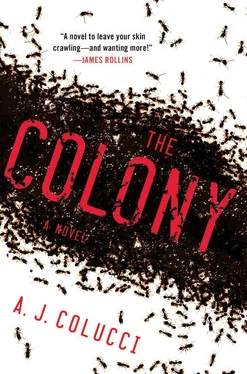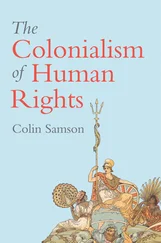The room fell silent and everyone stared dumbly at Kendra. The mayor cleared his throat and turned to his staff with an accusing tone. “I guess that would explain our rash of subway outages. Sixteen road cave-ins this year. Con Ed is nearly out of their minds with shortages.”
“Not to mention the missing rat population,” Pat muttered. Then he added, “Still, there must be some kind of bug spray we could dump on them.”
The mayor called attention to three men sitting around the table in identical pinstriped suits. “These gentlemen are representatives from the largest chemical companies in the world.”
Kendra scrutinized the men. All three were beaming with pride, as if they were superheroes flown in to save the planet. She recognized the tall one from Cytex, the largest global manufacturer of insecticides. He was an irritating man named Preston something-or-other, who tried to compensate for his baldness by pulling the last fringe of his hair into a slim ponytail. Preston had tried to shut down COP’s journal for what he called repeatedly misstating facts. He gave Kendra a sly wink, signaling that he remembered her too.
“The three of you will be working with Dr. O’Keefe,” the mayor announced, and smiled at the men with optimism. “Paul tells me you have some effective methods to stop all types of insects.”
“Quite effective, yes,” Preston assured the mayor, and the other two nodded accordingly.
Flustered, Kendra eyed Paul, and he turned away. Working with pesticide companies had long been a point of disparity between them. Paul reasoned it was easier to work with them than fight them. “There’s never been a pesticide that has been able to stop the spread of fire ants,” she told the mayor definitively.
The mayor forced a grin. “And what do you propose we do?”
“I’m not sure,” she replied. “Did anyone think about evacuating the city?”
Paul stifled a chuckle, covering his mouth with a cough. The mayor’s staff seemed to look in six different directions. Kendra had the feeling the subject had been brought up before.
“Eight million people?” Russo cocked his head, ripped off his glasses. “Do you have any idea how much money that kind of undertaking would cost? Police, emergency crews, assistance for the sick and elderly, temporary housing, transit and traffic—”
She raised a defensive hand. “Hey, you’re the one claiming these ants—”
“Forty million dollars!” he declared. “Per day. I’m not even taking into account yet another huge collapse of the stock market and worldwide financial loss.”
“Financial loss?” she burst out with a biting smirk.
“Look.” The mayor held up his hands with the placating smile of a longtime politician. “This isn’t something that’s going to be solved with a couple of pest strips and a can of Raid. It may take years to get rid of them.”
“So what do we do in the meantime?” Pat asked.
“We play offense. The last attack was underground. We’ll be shutting down the Lexington subway line, sending in excavation teams. They’ll be in full gear, tearing up the walls next week. Paul, we’re going to need the most help from the scientific community. Someone has to figure out how to kill these things. I’ve assembled this team because we’ve got to keep this city running, and I know you can be trusted not to say a word about this.”
“So we’re the whole team? Are we supposed to save the city by ourselves?” Pat asked.
“Don’t be ridiculous. We’ve got the army, the FBI, Homeland Security. People are going mad in Washington trying to solve this crisis.”
“Great,” Pat muttered, glancing at the attorney general. “Washington.”
“So how are we supposed to kill them?” Pat nodded to Colonel Garrett. “Didn’t you just tell us these ants are indestructible?”
The colonel replied, “Out in the field, they are virtually impossible to destroy.” He looked at Kendra. “You are correct that pesticides are probably out of the question. The same is true for conventional warfare, chemical and biological weapons, megabombs and fuel air bombs. So far, we know of only one full-proof method to kill them. When hit with a blast of atomic radiation, they die instantly.”
No one said anything. The White House chief counsel looked pale.
“There are other ways to destroy ants,” Kendra finally said. “Advanced technologies that won’t leave the city a toxic dump or radioactive wasteland.”
The mayor raised a brow. “Let’s try to remember, these are bugs after all.”
“Insects,” Kendra corrected out of habit.
“Whatever,” the mayor continued. “Paul has been running tests all week and I have no doubt that he can eventually figure out how to kill them.”
“I’m sure you’re right,” Paul said. “Ms. Hart, would you like to review the findings?”
Before she could respond, Russo said, “That’s an excellent idea. Tomorrow I expect your lists of problems and solutions—I don’t want any more deaths on my watch.”
The group rose in quiet murmurs.
Kendra nearly bumped squarely into Agent Cameron. “Smiling Dan,” she said with sarcasm.
He handed her a map of the bunker. “You’ll need this. It’s a diagram of the entire complex.”
She stared at the long tunnels and tiny chambers. “Looks like an ant colony.”
“You can enter any of these rooms. Cafeteria, laboratory, computer room, laundry, everything you’ll need.”
“Everything but sky.”
“You won’t be leaving for a few days. Cell phones don’t work but the mayor has an outside line in his office. All the computers have Internet connections, carefully monitored by a security team. I can escort you outside for emergencies only.”
“Thanks, Dan.” Paul took Kendra by the elbow. “I think she’s all right for now.”
Agent Cameron smiled through straight white teeth. “Paul O’Keefe, right? Belong to a few radical organizations.”
“I guess. If you consider Greenpeace radical.”
“Scientists for the Preservation of Earth. Americans for Responsible Government.”
“Your point?”
Cameron looked at Paul, his eyes icy and emotionless. “No point, Doctor.”
THE SMELL OF FORMALDEHYDE was a comforting memory to Kendra as she checked out the laboratory. The squared walls were painted white and the lab was well stocked. There were bottles of dead ants with their legs to the ceiling and live ones feverishly cleaning antennas. Microscopes, beakers and test tubes lined black lacquer counters. Inside an open closet she could see a stack of boxes containing ant-proof suits labeled BUG OUT, and she wondered if there was a field trip in her future.
And then there was Paul. Despite the underlying rage of being kidnapped, Kendra felt excited to be near him again. There was no denying the fluttering in her stomach. It felt less like butterflies than a flock of seagulls fighting over the last clam. She was disgusted at the way she licked her lips to make them glossier, instead of turning on her heels and walking out.
“Well, well,” she said smugly. “Everything we need to save an entire city.”
“I stocked the place myself.”
“An actual electron microscope,” she quipped. “Guess you thought of everything.”
“Yes,” he answered, eyeing her from head to toe. “I did.”
She finally snapped. “Paul, what the hell is going on!”
The spell was broken.
“You heard what they said.”
“I heard an utterly preposterous story. The very idea that ants can be trained like—like circus monkeys is ridiculous.” She folded her arms and blurted, “I don’t know why you chose me of all people to assist you, but if you were hoping for a cheery reunion, it’s too late. You blew it.”
Читать дальше












